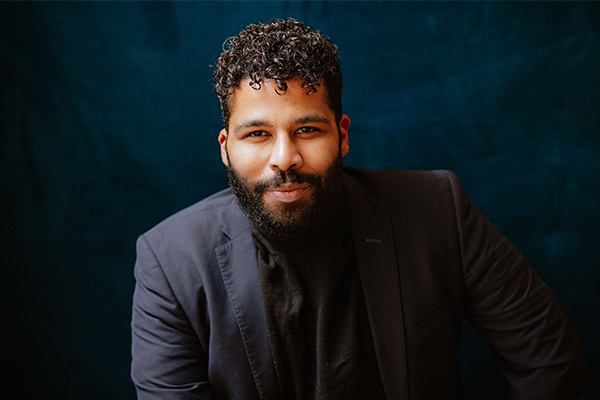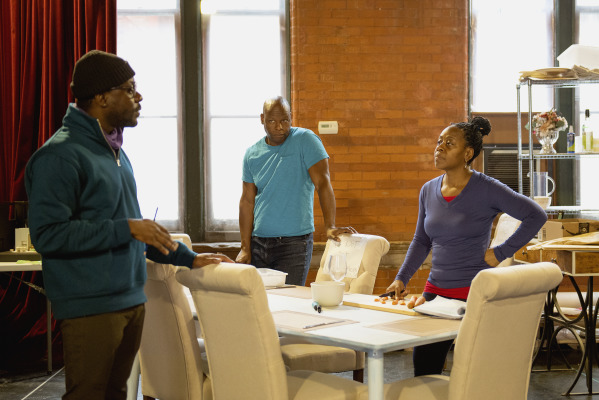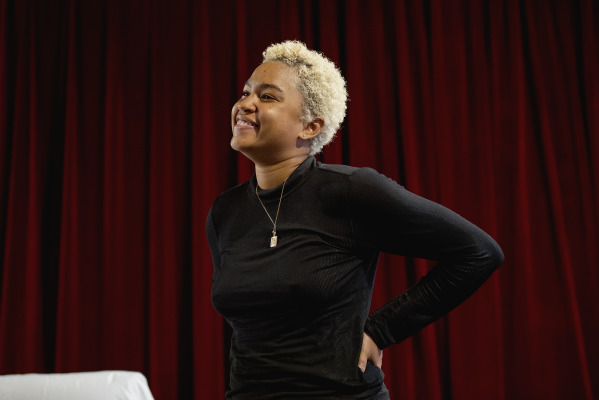Fairview Welcome
We are looking forward to having you join us for Canadian Stage and Obsidian Theatre’s production of Fairview by Jackie Sibblies Drury. In preparation for your attendance, we invite you to read the following messages and thoughts around this provocative play from our Associate Artistic Director Jordan Laffrenier.
You can listen to an audio version of this essay here.
In preparation for the performance, we would like to offer some thoughts about the play from Canadian Stage Associate Artistic Director Jordan Laffrenier.
Visible - An Essay Response to Fairview by Jordan Laffrenier
“What are you looking at?” The first line of a play often tells us what the play is about. “What are you looking at?” is the first line in Fairview. It's a line that encapsulates something I feel deeply: That I am being looked at or looked through. That I am, at every moment, both completely visible and invisible: “What are you looking at?”
I have been the only Black person in the audience at a ballet. I have also been the only Black person in the audience at a rap concert. Look around the audience tonight and you will likely notice that I am not the only Black person, however, most of the audience is white. “What are you looking at?”
Recently, I worked on a benefit that honored two Black superstars, performed by mostly Black superstars. The audience consisted almost exclusively of white people watching in their seats, while my mother danced loudly up and out of her seat. While I was embarrassed, my embarrassment quickly turned to discomfort when I thought about the white gaze on these Black performers. It felt poignant, like we had not quite moved beyond the painful history of minstrelsy. Here these performers were singing their hearts out and the response was mostly met with white people looking at them. Maybe my mother, through her dancing, was making a point about the theatre. Maybe she was unwittingly saying that this is a Black show and I am going to watch it the only way I know how. “What are you looking at?”
Theatre spaces have been having conversations about diversifying audiences for a long time. Though there are certain narrative comforts that get prioritized in our art form that get in the way of diversification. Who is watching the work? Who is passing judgment? Who gets to criticize? Who is programming the work? Who has a fair view?
In Dark Matters: On the Surveillance of Blackness, Simone Browne writes about the impact of surveillance on Black life. She argues that surveillance is often discriminatory, that it defines boundaries and privileges whiteness She states that “although surveillance is penetrating deeply throughout our society, its penetration is differential and has been racialized…today’s seeing eye is white.”
Jackie Sibblies Drury and Sarah Benson used Simone Browne's book as research material when developing Fairview. The two met in 2012 at Berkeley Repertory Theatre's Summer Residency lab while each working on different projects, and then returned to Berkeley Repertory in 2015 for The Ground Floor Summer Residency to work together. As they spent more time together, they began having more conversations about surveillance. During their process, they asked six actors to do a deep dive on the internet to find as much information as they could about their fellow castmates. From their unsettling results, they developed the play's foundation.
Jackie’s writing process always begins with an idea. Her next step is to collect materials, write materials, and participate in workshops that allow her to hear her work aloud. As a separate note on how long theatre shows take to develop: though they started working on the show in 2015, the show first premiered in 2018.
“It started as a piece about surveillance, not in terms of technology but in terms of thinking about why surveillance feels more dangerous to people of colour because of the implicit bias around the people who are actually doing the surveilling…the piece shifted to really thinking about the way that people understand worlds they observe and live in.” - Jackie Sibblies Drury
I first saw a Jackie Sibblies Drury play when I saw a production of We Are Proud to Present a Presentation About the Herero of Namibia, Formerly Known as Southwest Africa, From the German Sudwestafrika Between the Years 1884-1915 (that is the actual title!) at the Theatre Centre produced by Why Not Theatre. In this play, a group of actors attempt to make a play about the genocide of the African Herero tribe by German colonists but they struggle because the only written records are written by Germans. “All we are doing is hearing the white version of the story over and over again” states a character in the play. The whole play is staged to be set in the round and if I remember correctly the night that I saw it the audience was segregated at the beginning of the show. The whole thing was uncomfortable, especially being one of the only Black people in the audience. The theatricalization of otherness is a consistent theme in Jackie Sibblies Drury’s work.
“I am a little bit obsessed with watching whiteness and blackness. I do think that it was about going to see a lot of plays in my teens, 20s, 30s, and often being the only person of color in an audience and often feeling very visible in that way. And even welcomed in a very ‘So what brought you to the play? We’re so happy to have you,’ on the good end of the spectrum. And then if I ever did anything wrong, if I forgot to turn off my cellphone, I’m feeling very not welcome in that space.” - Jackie Sibblies Drury
In her most recent play, Mary Seacole, she wrote a non-traditional bioplay about Mary Seacole. “If you don’t know who she is - google her” Jackie writes in the stage directions. The play jumps between time and place, between Jamaica and America, and between characters, most of whom are named Mary (Mary, Merry, Duppy Mary), sometimes in the same monologue. In case you are worried that work such as this will expand your brain beyond its capabilities, don't be. Jackie is so direct that even the most complex ideas are easy to comprehend. From Mary Seacole: “You go there and they make you work and mock you well you do it. You go there and they will not see you as human…them need us but them nah want us.” Her ability to refocus our attention towards people who do not normally receive attention is one of my favourite things about Drury’s work. There are not really plays about Mary Seacole and there are too few plays about Black middle class families, like the family you are about to see in Fairview.
I am inspired by theatre that challenges me. Although I understand from watching a lot of theatre that theatre is not always challenging. When I watch Jackie's work, I become a participant - it's rarely a passive experience, it's always challenging, and I sense that I'm part of the process. Since her work is so unique, it's impossible to say if a Black person will like it or a white person won't because there are so many ways to experience the play. When Sarah Benson, who is white by the way, was asked in a talk-back interview why she directed and developed this play she said she feels “this play is equally about Blackness as it is about Whiteness.” Jackie has echoed that this show cannot have a Blackout night for similar reasons. I believe personally this show is for a Black audience and directed to a white audience, but perhaps Jackie’s work is more complex than that. Maybe Jackie is trying to point to something that we are all culpable of or actively participate in. I, too, watched my mother dance in embarrassment (mom if you are reading this I am sorry!). I encourage you to watch this show however you feel the most inspired watching it. I encourage the laughter, the joys and the silences, the discomfort and the exuberance, I encourage you to participate the way Drury asks us to participate and to consider what it is you are looking at.
“I grew up as a theater dork who memorized all the lyrics to Rent and Les Mis, and I was in plays in elementary school after school always. And so ... even as I grew older and experienced other things, I just — I really like the form. I like that you have to be in a room with other people. I like that you hear other people cough, and you get annoyed at people who have big hair sitting in front of you, and that there's just this crazy, embodied experience. And so I like that a lot of different people can come into a room and have a similar point of focus, but really, really different experiences. And that just is something that is inspiring to me.” - Jackie Sibblies Drury



.png)

.png)
